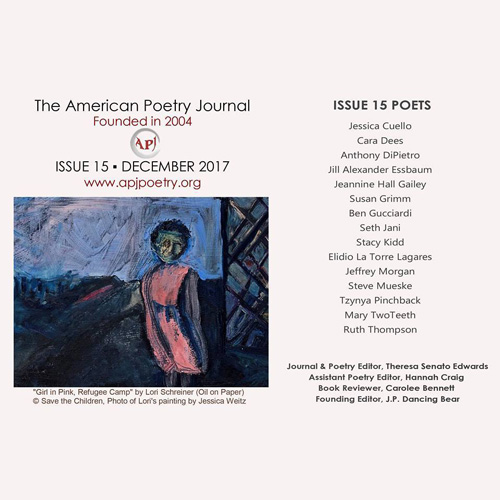The American Poetry Journal – December 2017
With 2017 over and two weeks into the new year, it kind of feels like getting through last year was surviving something. Reading the December 2017 issue of The American Poetry Journal, I found myself drawn to poems that consider different types of survival.
With 2017 over and two weeks into the new year, it kind of feels like getting through last year was surviving something. Reading the December 2017 issue of The American Poetry Journal, I found myself drawn to poems that consider different types of survival.
One of these is “I Nod When the School’s Visiting Doctor Asks if I Eat Three Meals a Day” by Jessica Cuello. The speaker’s method of survival:
In my family
you recreate invisibleand freeze like a rabbit.
You do not cry—
Later she reiterates, “No one // confesses anything.” Even the poem doesn’t give too much—gives just enough—and is heartbreaking in its honesty. Cuello’s other poem fits into the theme of making it through alive: “Escaping the Apartment Fire,” describes making it out of the nightmarish scene of losing everything in a fire, and witnessing an injured neighbor who: “held his burnt arm / like a hurt animal I stared / at its red inside and saw bone.”
Tzynya Pinchback’s prose poem “How to shave your head after the first chemotherapy cycle” instructs: “Tell yourself this is not hair.” Instead, assign it a new name and meaning. It is “Mister Curtis blowing the reefer smoke from his mouth into your mouth, your mom in the foyer doing a bump while your baby brother lies curled at your feet, dreaming. This is not hair.” The scene is expanded upon, more detail given to the abuse that unfolds upon the speaker at age eight. Shaving off the hair becomes shaving off “your mask” put on for survival, becomes shaving off the painful memories.
Jeannine Hall Gailey writes about “One More Attempt at Disaster Preparedness”:
Because it’s got to be more than water bottle and batters,
an escape plan and a full tank of gas.
It’s also what to do when you get the diagnosis you might not survive,
When your legs give out unexpectedly beneath you,
When your organs flutter and fail one by one.
She ties the personal pains and worries of sickness and applies them to what else is happening around us:
three hurricanes at once bear down on your coast,
or wildfires near your hospital, your neighborhood —
all disasters become less abstract, more personal.
A friend that visits with no warning, a song lyric you remember
vaguely from junior high.
We remain untouched and unable to fully plan for or change the outcome of disasters no matter how much we try, and no matter how big or small, widespread or personal it is.
Also considering health and hospitals is Jeffrey Morgan in “Translation”: “Each evening after dinner / my neighbor drives across town to his girlfriend who is dying.” They make small talk, but after the neighbor climbs into his truck to leave, the speaker mouths the words: “I remember when my brother was dying.” Images of god show up twice in the poem, the belief in a higher power perhaps another form of survival for some.
While the other poets in this issue of The American Poetry Journal tackle other subjects, the poems that speak on endurance and making it through resonate and shine most brightly. Poetry itself can be a method of survival, both writing and reading it. The December 2017 issue of The American Poetry Journal is a reminder on how to keep going, to keep trying.
[www.apjpoetry.org]






